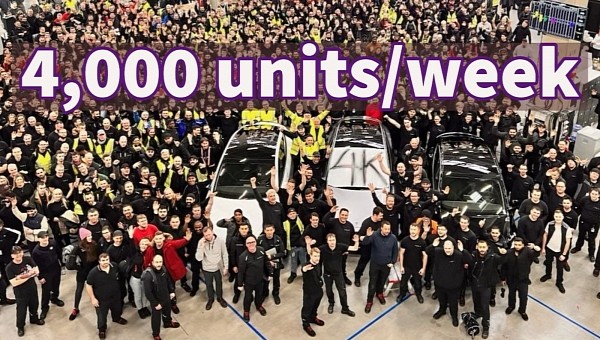Tesla Giga Berlin had a rough start last year, with major delays and clashes with regulators and environmentalist groups. Despite all this, the American EV maker has managed to ramp up production and is now at 4,000 units per week. Just 10 weeks ago, Tesla reported a peak production of 3,000 cars per week.
When Elon Musk decided to establish Tesla's most cutting-edge production facility in Germany, he most certainly did it on a whim. There was no objective reason why you would want to produce cars in Europe's most regulated, unionized country, with some of the highest wages in manufacturing. But Musk wanted to make a statement. He wanted to show the German car industry that Tesla was literally at their doorstep.
The establishment fought back with all its might. It rallied the environmentalists to protest every single move. It made it so that every step Tesla made was as painfully slow as possible. Instead of the planned production start in 2021, Giga Berlin turned on the production line in March 2022, almost a year later. And the struggles didn't stop then, as Tesla continued to fight regulators and environmentalists every step of the way.
And yet, somehow, on December 15, 2022, nine months after it opened Giga Berlin, Tesla reached a 3,000 units per week peak production. This was an important milestone, meaning the gigafactory could build over 150,000 cars per year. Ten weeks later, Tesla Europe announced another milestone, assembling the 4,000th Tesla Model Y in a week. This represents a 33% production increase in a relatively short time.
The new milestone means that Giga Berlin has a run rate of 208,000 Model Y cars per year. We would've thought Giga Texas would be there first, considering they have opened just weeks apart. Tesla had a blank check in Austin, with nowhere near as many hurdles as it had in Gruenheide. Giga Austin should not be far behind, though, and should reach 200,000 cars per year in the coming weeks. With all those gigafactories at speed, Tesla's total production capacity exceeds 2 million units per year.
However, clouds are gathering in Tesla's sky, as it has a very imbalanced production. All those gigafactories are mostly assembling the Tesla Model Y and, to some extent, the Model 3. There are signs that the demand for these models is dropping, with inventories building in Europe and China. Shorter delivery times and the recent price cuts also seem to support the impression that Tesla is running out of steam.
Tesla must launch new cars into production and refresh its existing lineup to energize sales. We've seen that the EV maker is working on an updated Model 3 under the Project Highland moniker, and the Model Y should not be far behind. But, just as with the Model S/Model X, the refresh would hardly touch the design and focus on technology instead. This is less of an incentive for Tesla owners to upgrade their cars to a newer model.
The establishment fought back with all its might. It rallied the environmentalists to protest every single move. It made it so that every step Tesla made was as painfully slow as possible. Instead of the planned production start in 2021, Giga Berlin turned on the production line in March 2022, almost a year later. And the struggles didn't stop then, as Tesla continued to fight regulators and environmentalists every step of the way.
And yet, somehow, on December 15, 2022, nine months after it opened Giga Berlin, Tesla reached a 3,000 units per week peak production. This was an important milestone, meaning the gigafactory could build over 150,000 cars per year. Ten weeks later, Tesla Europe announced another milestone, assembling the 4,000th Tesla Model Y in a week. This represents a 33% production increase in a relatively short time.
The new milestone means that Giga Berlin has a run rate of 208,000 Model Y cars per year. We would've thought Giga Texas would be there first, considering they have opened just weeks apart. Tesla had a blank check in Austin, with nowhere near as many hurdles as it had in Gruenheide. Giga Austin should not be far behind, though, and should reach 200,000 cars per year in the coming weeks. With all those gigafactories at speed, Tesla's total production capacity exceeds 2 million units per year.
However, clouds are gathering in Tesla's sky, as it has a very imbalanced production. All those gigafactories are mostly assembling the Tesla Model Y and, to some extent, the Model 3. There are signs that the demand for these models is dropping, with inventories building in Europe and China. Shorter delivery times and the recent price cuts also seem to support the impression that Tesla is running out of steam.
Tesla must launch new cars into production and refresh its existing lineup to energize sales. We've seen that the EV maker is working on an updated Model 3 under the Project Highland moniker, and the Model Y should not be far behind. But, just as with the Model S/Model X, the refresh would hardly touch the design and focus on technology instead. This is less of an incentive for Tesla owners to upgrade their cars to a newer model.
4k Model Y built at Giga Berlin this week ????
— Tesla Europe (@tesla_europe) February 27, 2023
Congrats to the Tesla team! pic.twitter.com/VJ0qBPkQ6U









